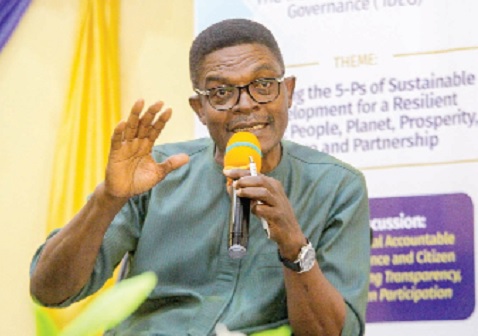
Participants advocate active role of political parties in
Participants in a panel discussion on Ghana's Local Government System at the 76th Annual New Year School have emphasised the need for political parties to play a more active role in local governance.
They argued that allowing political parties to put forward candidates at the grassroots level would bring in individuals with best expertise, network and knowledge to lead local community development.
The participants noted that political parties are already involved in the election of assembly members, despite the current system's attempts to downplay their role.
They questioned the wisdom of ignoring this reality, instead advocating a more inclusive approach that would make local leaders more accountable to the people.
By allowing political parties to participate in the election of local leaders from unit committees to metropolitan, municipal and district chief executives (MMDCEs), the participants believe that Ghana can ensure a more sustainable and bottom-up approach to development.
This, they argued, would enable local leaders to mobilise critical resources, identify key needs and accelerate development in their constituencies.
The discussion focused on Ghana's Local Government System, Citizens Engagement, Security and Peace Building on the sub-theme: "Peace Building, Digital Accountable Democratic Governance and Citizens Engagement: Improving Transparency, Efficiency and Citizens Participation".
The panel discussion was organised by the Institute of Democratic Governance (IDEG) in partnership with the UG School of Continuing and Distance Education (SCDE) as part of the ongoing 76th Annual New Year School.
Some panelists at the same event had advocated the election of MMDCEs on partisan lines.
The panellists were an independent scholar and political scientist, Professor Joseph Atsu Ayee; a former Dean of the University of Ghana (UG) School of Law, Prof. Kofi Quarshigah; a Senior Lecturer and former Head of the Department of Political Science, UG, Dr Maame Adwoa Gyekye-Jandoh, and the Executive Director of the Institute for Democratic Governance (IDEG), Dr Emmanuel Akwetey.
Recall
In early 2019, the previous government introduced two bills seeking to achieve two major local government reforms to fulfil one of its 2016 campaign promises – an amendment of Article 243[1] of the Constitution, which gives the President the power to appoint all Metropolitan, Municipal and District Chief Executives (MMDCEs) to make these positions elective and to hold a referendum to seek citizens support to amend Article 55[3] of the Constitution (an entrenched provision), which bans political parties from participating in local level elections and make such elections partisan.
However, in December 2019, the referendum was suspended due to ‘a lack’ of broad national consensus and the then-Attorney General and Minister of Justice withdrew the Constitution Amendment Bills 2018 (meant to amend Articles 55[3] and 243[1], respectively) from Parliament.
A 2021 survey conducted by the Ghana Centre for Democratic Governance (CDD) indicated that seven in 10 Ghanaians (76 per cent ), favour the election of MMDCEs, while 20 per cent wanted them to be appointed by the President.
